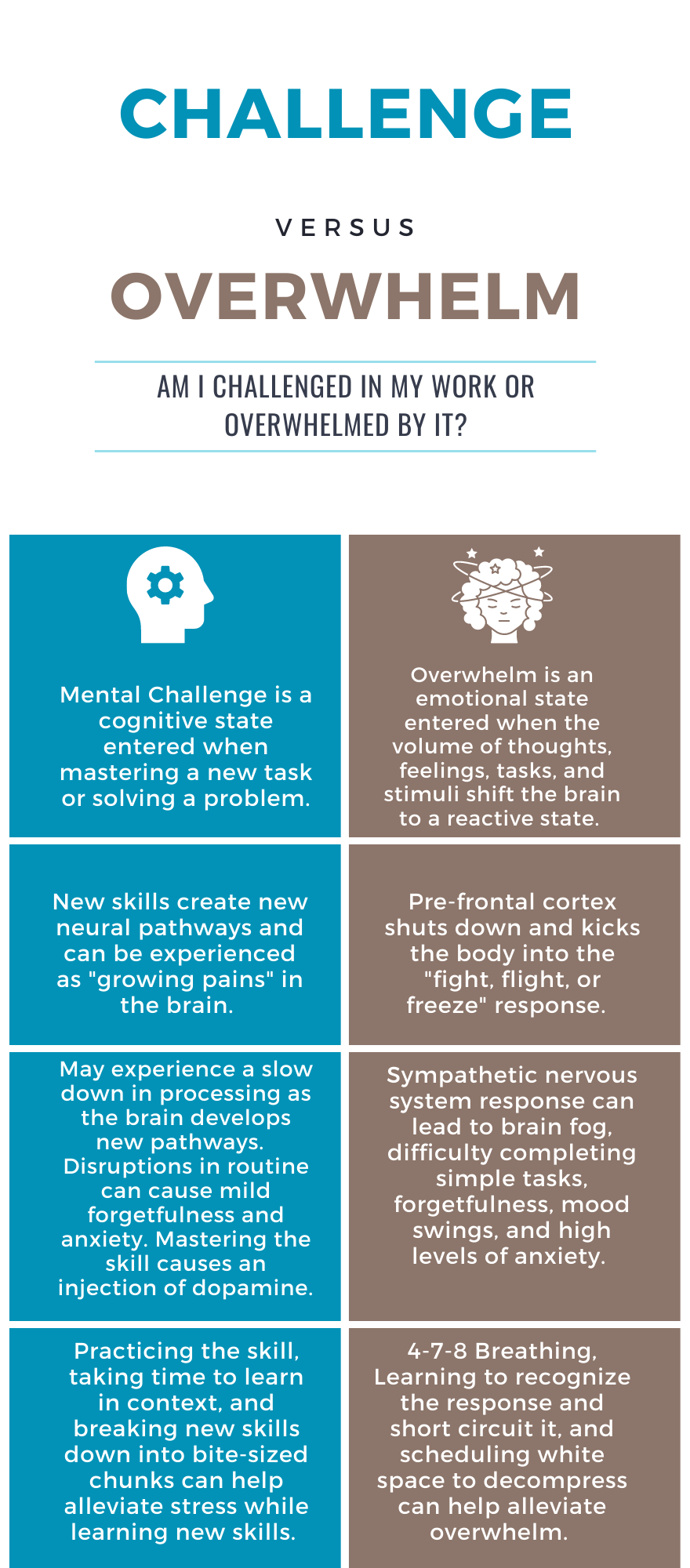Challenge vs. Overwhelm?
Sitting in a meeting the other day, I was overcome by a familiar sensation. As our teamed poured through the action plan for a new project, my heart began to race, my palms began to sweat, and anxiety started to crowd my brain. Sitting at my desk later, looking over the long list of action items on my to-do list, I took a long deep breath and asked myself a question that has become critical in maintaining a healthy outlook over the past few years. Is this a mental challenge? Or am I overwhelmed?
The distinction is important for several reasons. While some symptoms may be similar, intervention strategies for dealing with each situation differ significantly.
Regular mental challenge in life is a good thing. It strengthens the brain and expands your potential. Mental challenge is a cognitive state entered when mastering a new task or working to solve a problem. As we develop new skills, we create new neural pathways which expand our brain's capacity. This growth can cause a temporary slowdown in processing ability that often mimics brain fog, the brain can register these "growing pains" as physical discomfort at times, and the disruption of routine can cause resistance to change. Our brains release adrenaline when faced with a new challenge- which may account for the mild anxiety and hyper-vigilance that sometimes occurs when faced with new things, but also releases dopamine when we accomplish a new task. To ease these sensations, practice the new skill and try to learn it in the framework of a skill you already understand. Make a list and break down your new task into digestible chunks and be sure to give yourself white space to process and learn.
Overwhelm is an emotional state and a form of emotional and mental distress. Overwhelm is defined by Michelle Rees as the state in which the volume of thoughts, feeling, tasks, and stimuli in our daily environment shifts our brain and nervous system into a reactive state. In this state, the "primitive" brain takes over, the prefrontal cortex shuts down and the brain is kicked into a "fight, flight, or freeze" state. As a result, overwhelm commonly leads to anxiety, a sensation of claustrophobia, irritability, and mood swings. Brain fog, the inability to manage even the simplest tasks, difficulty making decisions, and forgetfulness are all symptoms of overwhelm and are a direct result of the "primitive" brain's determination that the body is in a life-or-death situation. Our "fight or flight" response is super helpful in a crisis, but in the case of overwhelm, it can be crippling and lead to a loss of productivity.
How do you battle the "overwhelm monster"? Step one is to recognize and learn to control the response. One of the best ways to help your body shift from the sympathetic to the parasympathetic nervous system is to BREATHE. 4-7-8 breathing, a technique borrowed from PTSD treatment, is one the simplest methods to slow your heart rate, relax your muscles, and reduce your blood pressure. Breathe in through your nose for four counts, hold for seven, and out through your mouth for eight counts. Repeat until you feel the body begin to relax a bit. Another way to help work through overwhelm is to write everything down in a total brain dump. Emotions, to-dos, thoughts- get it all out on paper- then take some time to categorize and prioritize the to-dos. Finally, if you find yourself struggling with overwhelm on the regular, make sure that you are scheduling "white space" in your calendar and that you are bringing your full self (newsflash: your "home" self and "work" self are the same person!) you bring to the table when you are calendaring events.

Shawna Lake is the Founder of Deep End Talent Strategies, an HR consulting firm helping individuals and businesses calm chaos, focus on overcoming challenges, and reducing the overwhelm.